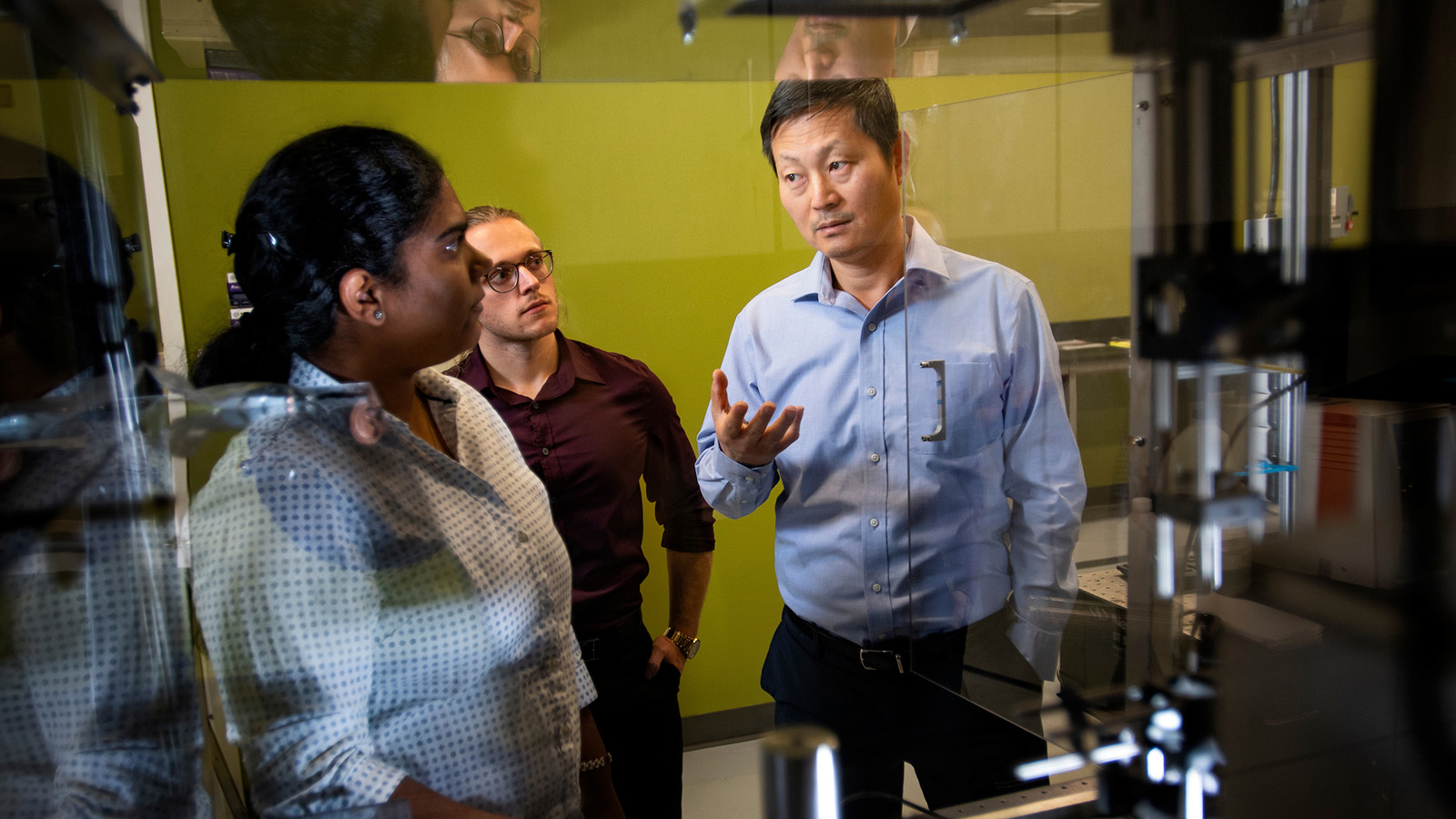- AcademicsDegree TypeLocations
- Admissions
- Tuition & Aid
- Student Life
- About UNT
- Research
- Athletics
- Giving

Mechanical and Energy Engineering Ph.D.
Doctoral Degree (Ph.D.)
Program type:
Major
Format:
On Campus
Est. time to complete:
3-5 years
Credit Hours:
72 (with prior B.S.) 42 (with prior M.S.)
Take your education to the next level and apply advanced engineering knowledge and
techniques to create new solutions for a more sustainable future.
The Mechanical and Energy Engineering doctoral program at the University of North
Texas offers a ground-breaking opportunity to learn fundamental and applied knowledge
compatible with mechanical engineering, renewable energy, energy modeling, manufacturing
and fossil fuels.
Want more info?
We're so glad you're interested in UNT! Let us know if you'd like more information and we'll get you everything you need.
Request More InfoWhy Earn a degree in Mechanical and Energy Engineering?
Our Doctor of Philosophy degree is the first of its kind in Texas, and the innovative curriculum allows you to study and conduct research with world-class faculty members. This collaboration can lead to being published in professional journals, providing a validation of your hard work and strong research.
In addition, you'll work with faculty members to develop a broad and in-depth knowledge for solving energy problems. You'll explore topics such as:
- Bio-based green and sustainable products
- Energy-efficient intelligent vehicles
- Energy-efficient products and structures
- Fundamentals of energy
- Renewable and alternative clean energy
- Solid mechanics and controls
- Thermal energy and fluids
You can conduct research with faculty members in laboratories containing the most modern equipment in the nation. Among our facilities is the Zero Energy Research Laboratory where various energy technologies aimed at achieving net-zero consumption of energy are tested. The facility is the first of its kind in Texas. Other facilities include:
- Bioproducts Lab
- Center for Advanced Scientific Computing and Modeling
- Composite Mechanics and Manufacturing Lab
- Computer-Aided Design and Analysis Lab
- Functional Cellular Solids Lab
- Laboratory of Small Scale Instrumentation
- Manufacturing and Engineering Technology Lab
- PACCAR Technology Institute
- Thermal Fluid Science Lab
Marketable Skills
- Scholarly excellence
- Identify knowledge gaps
- Innovative research leadership
- Communication of complex problems /solutions
- Conceptualize/develop scientific reports/manuscripts
Mechanical and Energy Engineering Ph.D. Highlights
You will have opportunities that you won't be able to find at many other schools and
will be able to partner with world-class faculty and local industry leaders to make
an impact in both your field and your community.
The department offers state-of-the-art facilities ranging from a variety of instructional
laboratories to research facilities where you can develop next-generation technology
and solutions.
These facilities allow our faculty and students to work side-by-side on industry-sponsored,
cutting-edge graduate research.
The Mechanical and Energy Engineering doctoral program offers a ground-breaking opportunity
to learn fundamental and applied knowledge to create new technology for the healthcare
field with its concentration in Biomedical Engineering.
A Dissertation Boot Camp and other specialized workshops are available through the
Toulouse Graduate School®. Many of the workshops are available online for your convenience.
Many students seek internships or work part time in area industries given our proximity
to the metroplex.
Mechanical and Energy Engineering Ph.D. Courses You Could Take
Advanced Heat and Mass Transfer (3 hrs)
Fundamental conservation equations are established in the beginning. Based on the
fundamental equations, students learn laminar velocity and temperature fields, laminar
boundary layer, turbulent flows, natural convection and mass transfer. As a case study,
heat and mass transfer issues in chemical vapor deposition are discussed.
Multiphase Transport Phenomena (3 hrs)
Fundamentals of transport phenomena in multiphase systems including boiling, evaporation,
melting and solidification, sublimation and vapor deposition, condensation, two-phase
flow, and interfacial sold-liquid-vapor phenomena. Starting with the governing equations
with localized and averaging formulations and also including discussions of applications
to energy systems, electronic cooling and material processing.
Theory of Elasticity (3 hrs)
Analysis of stress and strain in two- and three-dimensions, equilibrium and compatibility
equations, and strain energy methods; torsion of noncircular sections, flexure, and
axisymmetric problems. Topics include kinematics, balance laws, constitutive equations,
nonlinear elasticity, classical small-deformation theory, formulation and solution
of boundary-value problems of linear elastostatics.
Impact Mechanics of Materials (3 hrs)
Stress wave generation, propagation and interaction with interfaces; uniaxial stress
and uniaxial strain waves; formulation and derivation of 1-D stress wave equations
in solids; experimental methods for high-rate material behavior characterization;
split Hopkinson (Kolsky) bars; dynamic fracture and fragmentation of brittle materials.
Energy Harvesting Technologies and System Design (3 hrs)
Energy harvesting is the conversion of ambient energy present in the environment into
electrical energy. Energy harvesting system has a wide range of applications, including
energy efficiency enhancement for a system, embedded power source for wireless sensor
networks, embedded power for biomedical devices. Introduces the design of energy conversion
and storage systems from mechanical energy. Major topics include: vibration energy
harvesting using piezoelectric materials, vibration energy harvesting using electromagnetic
technique, thermoelectric energy harvesting, energy harvesting circuits, storage of
harvested energy and selected applications of energy harvesting systems.
Advanced Numerical Methods (3 hrs)
Adaptive numerical integration; finite difference, finite volume, finite element,
boundary element and spectral methods; structured and unstructured solver development;
advanced methods to solve linear systems arising from discretization of partial differential
equations; stochastic methods; high-performance computing topics including cache optimization
and parallel algorithm development.
Learn More About UNT
Watch this video to learn more about what makes UNT great!